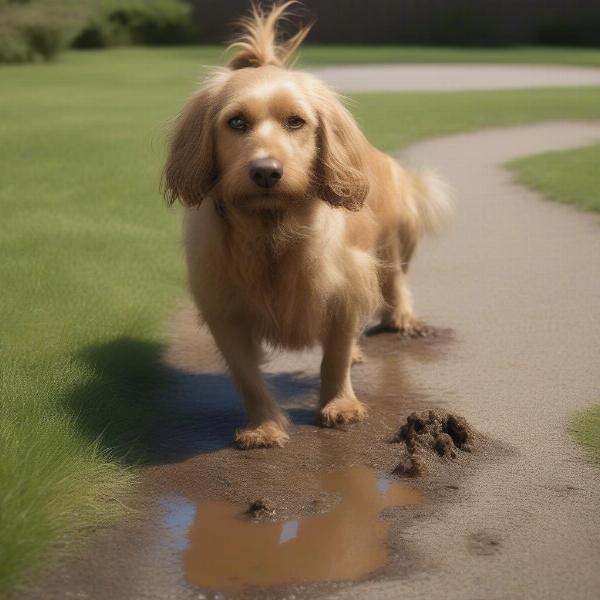Acidic substances are common in many households, from cleaning products to certain foods. Understanding a dog’s ability to detect these substances can be crucial for their safety. So, can dogs smell acid? The answer is complex and depends on several factors, including the type of acid, its concentration, and the individual dog’s sense of smell. Let’s delve into the fascinating world of canine olfaction and explore how it relates to detecting acidic substances.
How a Dog’s Sense of Smell Works
Dogs possess an incredibly powerful sense of smell, far surpassing that of humans. Their noses are specifically designed for detecting a wide array of scents. They have up to 300 million olfactory receptors, compared to a human’s meager 6 million. This allows them to discern subtle differences in smells that we can’t even perceive. Furthermore, the part of a dog’s brain dedicated to analyzing smells is about 40 times larger than ours.
Different Types of Acids and Canine Detection
Not all acids are created equal. Some, like vinegar (acetic acid), have a strong, pungent odor that dogs can easily detect. Others, like hydrochloric acid, are more dangerous and may not have a strong smell at lower concentrations. This means a dog might not be able to smell a diluted acid, even though it could still be harmful if ingested or comes into contact with their skin.
Can Dogs Smell Stomach Acid?
Dogs can definitely detect the scent of vomit, which often contains stomach acid. This is why they might be drawn to another dog’s or even their own vomit. While this might seem disgusting to us, it’s a natural behavior rooted in their scavenging instincts. In the wild, a dog’s ability to smell and identify potentially edible substances, even partially digested ones, could be crucial for survival.
 Dog Smelling Vomit
Dog Smelling Vomit
Protecting Your Dog from Acidic Dangers
Because dogs can’t reliably detect all types of acids, it’s essential to keep potentially harmful substances out of their reach. Store cleaning products, batteries, and other acidic materials in secure cabinets or high shelves. Be mindful of spills and clean them up immediately. If you suspect your dog has ingested something acidic, contact your veterinarian immediately.
Training Dogs to Detect Specific Acids
While not all dogs can detect all acids, some dogs are trained to detect specific acidic substances for various purposes, such as detecting bombs or illegal drugs. This specialized training demonstrates the incredible potential of canine olfaction.
Can a Dog’s Sense of Smell Deteriorate?
Just like human senses, a dog’s sense of smell can diminish with age or due to certain medical conditions. Regular veterinary check-ups are important to monitor your dog’s overall health, including their olfactory abilities.
Conclusion
While dogs can smell certain acids, particularly those with strong odors, they cannot reliably detect all acidic substances. Therefore, responsible pet ownership requires vigilance in keeping potentially hazardous materials out of your dog’s reach. Understanding your dog’s remarkable sense of smell and its limitations is crucial for ensuring their safety and well-being.
FAQ
- Can dogs smell battery acid? While dogs might be able to detect the metallic scent of a battery, the sulfuric acid inside may not have a strong enough odor for them to detect until it’s leaking, at which point it’s extremely dangerous.
- What should I do if my dog licks something acidic? Contact your veterinarian immediately.
- How can I improve my dog’s sense of smell? Providing a stimulating environment with various scents and engaging in scent-based games can help enrich your dog’s olfactory experiences.
- Do all dog breeds have the same sense of smell? While all dogs have a superior sense of smell compared to humans, some breeds, like Bloodhounds and Beagles, are known for their exceptional olfactory abilities.
- Can dogs smell uric acid in urine? Yes, dogs can detect uric acid and other components in urine, allowing them to distinguish between different individuals and even detect certain medical conditions.
- Why does my dog eat grass? While there are various theories, one possibility is that dogs eat grass to induce vomiting, potentially to expel something that has upset their stomach, including acidic substances.
- Can acid damage a dog’s nose? Yes, strong acids can cause severe burns and damage to a dog’s sensitive nose and other mucous membranes.
Related Articles on ILM Dog
About ILM Dog: ILM Dog is your premier online resource for expert dog care advice. From breed selection and puppy care to senior dog health and training tips, we offer practical, reliable information to help you navigate every stage of your dog’s life. We also provide guidance on nutrition, grooming, and finding the right products for your furry friend. For any questions or concerns, reach out to our team of experts. Email: [email protected], Phone: +44 20-3965-8624.